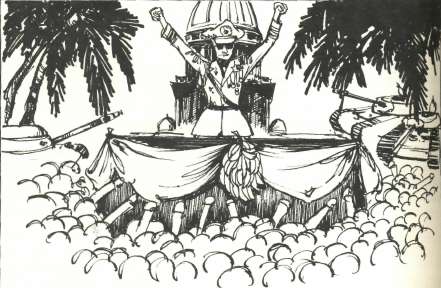 |
Home | Search | Browse | About IPO | Staff | Links |
 |
Home | Search | Browse | About IPO | Staff | Links |
|
The Day of the Banana Republic The press catches up with the coup  THE REPUBLICANS are still wondering why the Statehouse press corps didn't see the coup coming. It was newly elected Senate President David C. Shapiro, who finally revealed that the Republicans had been plotting for six weeks to overthrow the Democrats. Reporters had been quick to quote the Republicans, who joked about catching the Democrats with their political pants down. But reporters had been slow to see that the joke was on them. They had helped indirectly, and for that, Shapiro was grateful. The Republicans had followed the Democrats' every move in the papers. In early December, the press began reporting that the Democrats might not rally around Philip Rock, the 81st Senate president. By early January, the press was reporting that a nine-member faction, dissatisfied with Chicago Democratic leadership, had turned against Rock. When the Republicans read the Democratic caucus vote in the papers that Wednesday morning, they knew the Democrats were split. Then the Democrats walked onto the Senate floor later that morning — without Charlie Chew and without Harold Washington or his replacement. Thursday morning's papers reassured the Republicans that Chew was in the hospital and Washington had not been replaced. But the press still hadn't sniffed any of the Republican plans. After Shapiro was elected, the press dug for the story. Friday's papers reported that the Republicans had caucused with Gov. James R. Thompson twice Wednesday afternoon, urging him to rule as he did. Thompson told reporters that he had agreed, providing there was a legal precedent. By Wednesday night, Thompson said one of his personal lawyers, John Lynch, had found the precedent: it was the 1955 attorney general's opinion by Latham Castle that said a majority of House members present was enough to elect a speaker unless House rules called for more. Gov. Thompson refused to answer all other questions on his role in the Republican strategy. Afterwards, some reporters said they had known all along that a coup was possible. They had toyed with the odds of the Democrats appearing sans Chew and Washington, and thus outnumbered by Republicans, 29-28. And at one point, they had even asked Thompson's opinion of the possibility of the Republicans taking over the Senate (doing what Paul Powell and the Democrats had done 20 years ago: take the gavel from the majority of those elected). Thompson declined to comment, and finally, the press had dispensed with the idea as preposterous.
These reporters believed they had discovered the flaw in any plot: the governor, as the presiding officer, would have to do the dirty work. That wasn't Thompson's style. The truth is that the coup caught the Statehouse press corps off guard too. I was no exception. Only a handful of newspaper and radio reporters were in the Senate press boxes when the Republicans elected Shapiro. Most of the press corps was out chasing the Democrats who had left to caucus and never returned to the floor. The television reporters were the lucky ones. Encumbered by cameras, they had never left the gallery and captured on film the footage of Netsch dancing to her own quorum call. The press didn't get the story Thursday morning — and it probably never will. Reporters were able to piece the major events together only after a series of tedious press conferences Thursday afternoon and Friday morning. Only one reporter, Al Manning of The State Journal-Register in Springfield, attempted to restage the event; of the coup step by step. Overall, the media reacted to the unexpected by milking the metaphor of an overthrown Latin American government. Led by Paul Zemitsch of the St. Louis Globe-Democrat, the press pronounced Illinois a "banana republic." The Republicans had formed a "junta," and pulled off a "coup d'etat," a "palace revolt." The Republicans had "toppled the Democratic regime," sending Rock into "exile." When the case went to the courts, Shapiro became the "pretender to the throne," who had set up a "provisional government." The Globe found the analogy so effective, it instructed Zemitsch to continue to refer to Rock as "the president in exile." However colorful the copy, the State-house press corps was aware it was writing about a new page in Illinois political history. Historians may well use the words of Bill Lambrecht of the St. Louis Post-Dispatch when they recall January 15,1981; "The Day the Republicans Stole the Senate. " March 1981/Illinois Issues/8 |
|
|